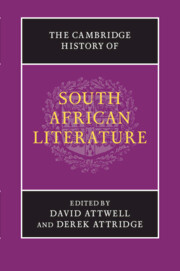Book contents
- Frontmatter
- Introduction
- PART I ORATURES, ORAL HISTORIES, ORIGINS
- PART II EXPLORATION, EARLY MODERNITY AND ENLIGHTENMENT AT THE CAPE, 1488–1820
- PART III EMPIRE, RESISTANCE AND NATIONAL BEGINNINGS, 1820–1910
- PART IV MODERNISM AND TRANSNATIONAL CULTURE, 1910–1948
- 14 Black writers and the historical novel: 1907–1948
- 15 The Dertigers and the plaasroman: two brief perspectives on Afrikaans literature
- 16 New African modernity and the New African movement
- 17 Refracted modernisms: Roy Campbell, Herbert Dhlomo, N. P. van Wyk Louw
- 18 The metropolitan and the local: Douglas Blackburn, Pauline Smith, William Plomer, Herman Charles Bosman
- PART V APARTHEID AND ITS AFTERMATH, 1948 TO THE PRESENT
- PART VI SOUTH AFRICAN LITERATURE: CONTINUITIES AND CONTRASTS
- Index
- References
17 - Refracted modernisms: Roy Campbell, Herbert Dhlomo, N. P. van Wyk Louw
from PART IV - MODERNISM AND TRANSNATIONAL CULTURE, 1910–1948
Published online by Cambridge University Press: 28 January 2012
- Frontmatter
- Introduction
- PART I ORATURES, ORAL HISTORIES, ORIGINS
- PART II EXPLORATION, EARLY MODERNITY AND ENLIGHTENMENT AT THE CAPE, 1488–1820
- PART III EMPIRE, RESISTANCE AND NATIONAL BEGINNINGS, 1820–1910
- PART IV MODERNISM AND TRANSNATIONAL CULTURE, 1910–1948
- 14 Black writers and the historical novel: 1907–1948
- 15 The Dertigers and the plaasroman: two brief perspectives on Afrikaans literature
- 16 New African modernity and the New African movement
- 17 Refracted modernisms: Roy Campbell, Herbert Dhlomo, N. P. van Wyk Louw
- 18 The metropolitan and the local: Douglas Blackburn, Pauline Smith, William Plomer, Herman Charles Bosman
- PART V APARTHEID AND ITS AFTERMATH, 1948 TO THE PRESENT
- PART VI SOUTH AFRICAN LITERATURE: CONTINUITIES AND CONTRASTS
- Index
- References
Summary
Roy Campbell (1901–57), Herbert Dhlomo (1903–56) and N. P. van Wyk Louw (1906–70) are the three most eminent South African early twentieth-century writers in English and Afrikaans: Campbell the expatriate settler, the first South African writer since Olive Schreiner to achieve an international reputation; Dhlomo the black Zulu-speaking African nationalist, who chose English as the medium of his work in drama, poetry, narrative and criticism; and Van Wyk Louw the Afrikaner, who remained at the forefront of his people's spiritual life from his leadership of the Digters van Dertig (Poets of the Thirties) until his death (see Chapter 15).
If modernism is European and Anglo-American in origin, and parades from Prufrock in 1917 to the complete Cantos of 1970, then its synchronous and historical refraction as it reaches South Africa complicates our reading of writers of this period, from the immediate aftermath of the Anglo-Boer War of 1899–1902 through the initiation of the armed struggle to the eve of the collapse of apartheid; through industrialisation and two world wars to the first hopes of a post-apartheid state. Given the medium of refraction, colonial (or dominion) modernism would never be mere imitation: neither Campbell nor Dhlomo nor Van Wyk Louw committed themselves unequivocally to the conventional formal devices of modernism – free verse, discontinuity, the epiphany. Van Wyk Louw mastered canonical verse forms early in his career, but in his last volume explored a prosody that recalls Mallarmé. Dhlomo fashioned his verse style from post-Romantic poetic diction and from African American writers of the early twentieth century, and Campbell his from Tennyson, the Symbolistes and Robert Service.
- Type
- Chapter
- Information
- The Cambridge History of South African Literature , pp. 339 - 359Publisher: Cambridge University PressPrint publication year: 2012
References
- 5
- Cited by

